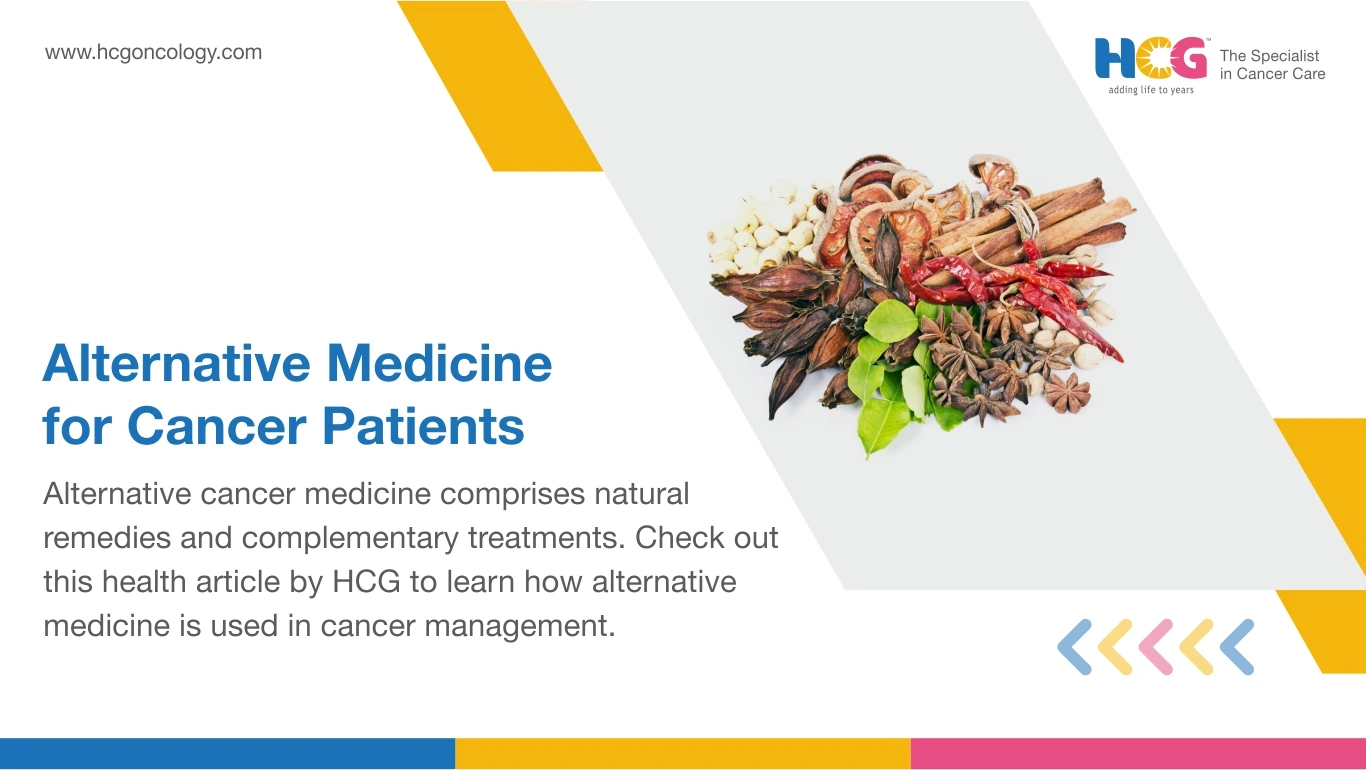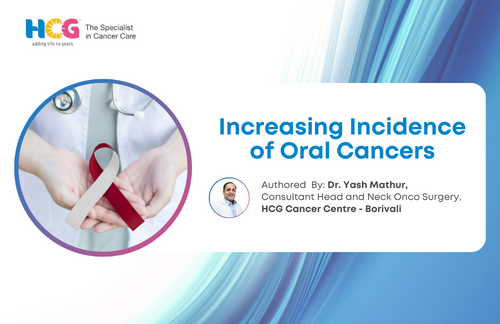
26 Nov, 2025
Feel free to reach out to us.

26 Nov, 2025

This article is medically reviewed by Dr. Devendra Parikh, Consultant - Surgical Oncology, HCG Aastha Cancer Centre, Ahmedabad.
"What are alternative medicines for cancer?"
A question that every cancer specialist gets asked by newly diagnosed cancer patients.
We see that our patients not only dread this disease but also dread the treatments available for it. This is understandable, as cancers are best managed with multimodal treatment plans, which come with their own complications and side effects.
In this article, we are touching on a very interesting topic, and that is complementary and alternative medicines for cancer.
Read this insightful article till the end to understand the nuances of alternative medicines for cancer, how they work, when patients can consider them, and what their limitations are, among others.
Complementary and alternative medicines (CAM) for cancer refer to the systems, health practices, and products used in addition to (complementary therapies) or as an alternative to (alternative therapies) conventional cancer treatment options.
CAM, as defined by the World Health Organization, refers to the practices and knowledge from native beliefs and cultural traditions used for the prevention, diagnosis, and treatment of cancer. Common CAM approaches include herbal remedies, acupuncture, homeopathy, energy-based therapies, and yoga.
The National Center for Complementary and Integrative Health (NCCIH) classifies CAM into three categories: mind-body practices (such as meditation, yoga, and massage), natural products (like herbs and supplements), and other traditional approaches.
Although several studies report high rates of prevalence of alternative cancer treatment among patients, the rates significantly vary because of study methods, cultural differences, and the definition of CAM. A systematic review of 26 surveys conducted across 13 countries reported an average prevalence of 31.4% among adults.
A survey of South Indian patients showed the use of CAM among 34.4% of cancer patients. Another study reported that about 39% of cancer patients in Trinidad and Tobago used CAM, with herbs and spiritual therapy being the most common.
The use also varies with the cancer types, i.e., breast cancer (39.6% of patients), prostate cancer (44.4% of patients), ovarian cancer (37% of patients), and colon cancer (38.7% of patients).
There are multiple complementary cancer treatment options available for cancer patients.
Many patients consider opting for alternative medicine for cancer during their treatment to reduce the treatment side effects and improve their quality of life.
Practices such as meditation, yoga, and acupuncture reportedly improve fatigue, pain, sleeping issues, and anxiety.
Acupuncture helps ease chemotherapy-associated nausea and pain. Mindfulness-based techniques reduce depression and stress.
However, the efficacy of complementary treatment for cancer is uncertain because of the lack of strong scientific evidence.
Some dietary and herbal supplements may interfere with conventional treatment and reduce its efficacy. Specific remedies, such as laetrile or black salves, may be dangerous.
Patients use alternative medicine for cancer for the following reasons:
Patients with cancer should note that all the CAM approaches should be discussed with their treating oncologists to ensure safety and to minimize interaction with conventional therapies.
At HCG, we put our patients at the center of their care journey and encourage them to play an active role in decision-making for their health and overall well-being.
When our patients wish to include alternative medicine in their existing treatment plan, we follow the below protocols:
Some of the tips to consider before using alternative medicine for cancer are:
The following are the different alternative medicines for cancer that can be considered:
Reports suggest that alternative medicine for cancer is found to alleviate treatment-related side effects among cancer patients, improving the overall quality of life and enhancing emotional well-being.
However, many therapies lack strong scientific evidence. Additionally, some CAM therapies may be unsafe. Patients with cancer should discuss with their healthcare provider before initiating CAM. It will ensure safety and avoid harmful interactions.

Dr. Devendra G. Parikh
Consultant - Surgical Oncology
MBBS, MS (General Surgery), MCh (Surgical Oncology)
Dr. Devendra Parikh is an experienced thoracic & esophageal surgical oncology consultant. He is available for consultations at the HCG Aastha Cancer Centre, a leading cancer hospital in Ahmedabad. He has completed extensive training and certifications from the National Cancer Centre, Tokyo, Japan; UPMC from Pittsburgh, USA; and a robotic surgery institute in Sunnyvale, CA, USA. He specializes in performing esophageal and GE junction cancer surgeries, along with colorectal cancer surgeries, and is experienced in performing minimally invasive surgeries such as laparoscopic and robotic surgeries. His treatment approach is evidence-based and focused on providing the best possible care to his patients.
Appointment Link: Book an Appointment with Dr. Devendra Parikh.
